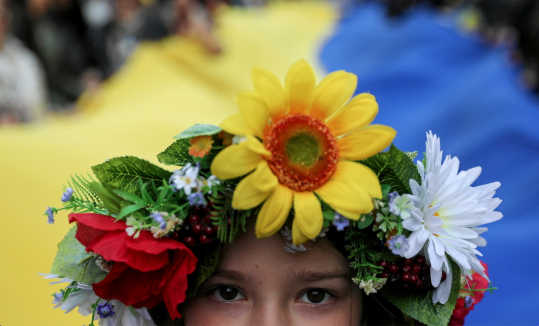Psychotraumatologist: The fact that people die is beyond my control. But I have the influence to give them my shoes

The war in Ukraine creates a feeling of powerlessness. We see people being killed, raped, injured. We are not able to stop it. How can we deal with this mentally?
As we observe suffering and violence, faced with evil that we cannot counteract, we may experience anger, a threat associated with the violation of fundamental values. It raises questions about whether the values of inviolability, subjectivity, and non-infringement are still valid. If we doubt it, we feel helplessness, powerlessness, impotence. Their source will be the fact that the world order is collapsing within us as well. We then ask ourselves: is this the new dimension where force, lawlessness, violence, bribery rule? Or are we, in fact, able to stand on the side of the values of everyone’s right to life and to feel safe in their own country? When we express active opposition to Russia’s aggression in Ukraine, and to what is happening on the Belarusian-Polish border, we advocate the latter scenario. Can we feel helpless in the face of the striking images from Bucza? We can. It’s natural. But the more we turn this powerlessness into concrete actions, the more we stand on the side of values, the more we show the oppressors that we are not afraid of them, that we will not be paralysed by fear, that we will not give up. Every day actions are important: actively helping Ukrainians or marches showing that we do not consent to violence. This is the most constructive way of dealing with the natural state of helplessness and powerlessness.
It seems to be a drop in the ocean. So what if I give the refugees clothes and food when their countrymen are still dying?
But the fact that these people are dying is beyond my control. Instead, I have influence over giving someone a doll, shoes, a bulletproof vest, and those things will make them think: ‘I am not alone’. The sea is made up of millions of droplets. The drops we direct toward the victims of war create a sea of good.
The refugees who have come into our homes also feel great powerlessness. Meanwhile, they themselves have almost nothing and cannot help their fellow countrymen.
I wouldn’t be so sure that they can’t. I supervise crisis interventionists who work directly with refugees. I know from them that a large portion of Ukrainians are task-oriented for survival. They feel they need to gather strength and survive to get back together and rebuild Ukraine when the war is over. A small percentage of people are convinced that they will settle in Poland for a long time. Moreover, well-educated people, and there are quite a few of them, are beginning to work actively for refugees, for example in schools where preparatory classes are being set up. Much depends on how Poles can tap into the potential of refugees. When it comes to adults, the situation is easier; it is different with children. I believe there will soon be a flood of emotional problems in children. For now, they may be acting seemingly ordinary because they are still in shock and the extreme stress is just coming off them. I estimate that various workshops and interventions, psychotrauma support for children will need to be launched in May. A mass movement of Poles is not enough in this case.
It is in May that our government wants to conduct eighth-grade exams for some of these children.
I would most like people making decisions about other people’s lives and doing it as if we are dealing with children who have just returned from vacation to take a course in psychotraumatology. A traumatised child functions according to the structures of the so-called reptile brain, following the ‘fight, flee, vanish’ principle. The structures that are responsible for thinking, reasoning, and cognitive processing are flooded with affect. Therefore, to put it mildly, it is highly imprudent to throw children into a system that requires the activation of cognitive competence. If the brain is flooded with stress hormones, there’s no way it can handle it. Additionally, making such unrealistic demands exacerbates the stress and effects of trauma.
Let’s go back to powerlessness. What does it cause in us?
Powerlessness occurs when we see no resources, only limitations. Dealing with powerlessness is about understanding the process that led to this condition within us. It’s important to ask yourself: what made me think that I had limitations and no resources in a given situation? If I recognise that this is the truth, I sink into impotence. We go into survival mode, which brings us closer to conditions such as depression, pre-suicidal thoughts, and a sense of meaninglessness in life. We increasingly withdraw from social activity. That’s what the abuser wants.
So is it worth doing anything to avoid falling into this state?
Definitely. For example, you can take a pack of bottles of water or toothpaste to a collection point for gifts for refugees. I have no control over what Putin has in his head, but I do control what I have in mine. So, I will not give him the satisfaction, I will not sink into myself with fear. The path we can’t take in this situation for any reason is negative thinking, powerlessness, collapsing into ourselves and disappearing.
Poles must have intuitively felt that this is the right thing to do, they started to help en masse. But more and more people are feeling tired.
We, Poles, are predisposed to help because we experienced partitions and wars, we were often victims. The key point is that on 1 September 1939, we were able to actively resist to Hitler. We showed that no matter how strong the enemy is, it is worth fighting because even defeat can be a victory. Action is the opposite of surrender. The Warsaw Uprising, which is criticised by many as being doomed to failure in advance, is an example of people fighting to protect their dignity, honour, humanity. Fight, because when you fight, you live. You are alive when you do not submit to the destruction of the abuser. The Ukrainians triggered in us the imperative to rescue the victims. They are blended into our culture, many of them working and living here for years. That’s why it’s easier for us to trigger the potential to help.
In contrast, you said there is an important phenomenon of fatigue of compassion and helping. In professional terms, this process is called deterioration of social support, and it is correct. Awareness of this regularity, among other things, is to exchange aid resources, specifically: people and environments. This allows you to come back with different energy and ideas. Therefore, we should not feel guilty that we no longer have strength. It is now our responsibility to take care of ourselves so that we can gain strength and then be able to open up to another form of helping. Especially as emotional problems begin to emerge in traumatised refugees after the initial shock. People who are not prepared to help in these situations have every right to feel tired and exhausted. They are not specialists in crisis intervention, psychotraumatology, or psychiatry.
But if we start taking care of our own mental well-being, who will help the refugees? Again, the sense of powerlessness returns.
Systemic solutions are needed. Huge amounts of money are flowing into Poland from all over the world. Patterns can be taken from Germany, for example. The Germans catalogue the Ukrainians very carefully according to their professions and involve them in helping their countrymen on an ongoing basis. No one will understand Ukrainians better than Ukrainians themselves. It is not difficult to prepare psychologists from Ukraine to work in the field of crisis intervention among small refugee communities. By helping them, they will help themselves, gaining a sense of empowerment. This is where they will be more useful than fighting on the front lines if they know psychology but can’t shoot. The guilt that they are here and not there will disappear. Refugees need to be helped to build a thread of continuity between life there and life here. Germans, when they know what kind of education someone has, distribute refugees throughout the lands. This fosters a process of smooth entry into new communities. Meanwhile, Warsaw’s population increased by as much as 17%. There is a shortage of jobs. Systemic management should be about deploying people to different places. The next thing that’s needed is the creation of mental and psychiatric support centres for children. The sooner we get them into professional support, the less impact there will be on their mental health and therefore on the future of generations to come. It is also important to create places where refugees can be educated, learn languages. Giving them the opportunity to act, to grow.
Why is it so important to feel empowered?
When I have agency, I can act. I have control. I feel that I have an impact on what is happening around me, and I am motivated to take action. The higher the level of control, the lower the level of anxiety.
How do we develop such agency in children?
If we raise children in a secure bond, that is, one in which there is sensitivity to the child and their needs and emotions, we strongly assert the child’s subjectivity. For example, a mum and her two-year-old daughter go for a walk in the rain. The girl wants to wear shoes that are not suitable for this weather. Mum can decide for herself what shoes her daughter should wear, but then it will work against her agency. She can also give her daughter a choice. Explain that if she puts on the shoes she likes, the walk will be short because the shoes will get wet. And if she wears wellies, she will be able to run through puddles. The child should be given choices: starting with the colour of the blouse or bedding. Your child wants to watch a cartoon? That’s okay. But let them know that by doing so they won’t have time for another pastime. A child shaped in this way will not have problems later with making decisions and choices. An authoritarian parent who knows better what is good for the child breaks them. In adulthood, such a person will wait for others to make the decision for them. They become extrinsic, devoid of agency. Agency also means responsibility; you can’t blame the wrong choice on another person.
In a war situation, is it possible to teach a child causality, for example, by asking them if they want to give their toys to their peers in Ukraine?
We can start a conversation with a child by saying that there are children among us who left everything behind, fleeing the war. Therefore, it is worth proposing: ‘Look, you have so many toys. Let’s think about which ones are your most favourite, and which ones you could give away without feeling a sense of loss’. This will allow the child to develop agency, empathy and compassion.


